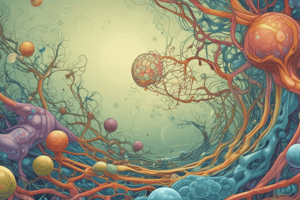Podcast
Questions and Answers
Which organelle is primarily responsible for protein synthesis?
Which organelle is primarily responsible for protein synthesis?
- Golgi apparatus
- Lysosomes
- Ribosomes (correct)
- Mitochondria
What is the primary function of cholesterol in the cell membrane?
What is the primary function of cholesterol in the cell membrane?
- To facilitate cellular signaling
- To provide mechanical support and protection
- To synthesize proteins
- To regulate fluidity and permeability (correct)
What is the primary function of cytoplasm?
What is the primary function of cytoplasm?
- To generate energy through cellular respiration
- To facilitate cellular signaling
- To regulate what enters and leaves the cell
- To provide mechanical support and structure (correct)
During which stage of mitosis do the sister chromatids separate?
During which stage of mitosis do the sister chromatids separate?
What is the primary function of the cell membrane?
What is the primary function of the cell membrane?
What is the primary function of cytokinesis in multicellular organisms?
What is the primary function of cytokinesis in multicellular organisms?
What is the primary mechanism by which hormones regulate cellular processes?
What is the primary mechanism by which hormones regulate cellular processes?
What is the role of receptors in cell signaling?
What is the role of receptors in cell signaling?
What is the outcome of incomplete cytokinesis?
What is the outcome of incomplete cytokinesis?
What is the primary function of signal transduction pathways in cell signaling?
What is the primary function of signal transduction pathways in cell signaling?
Flashcards are hidden until you start studying
Study Notes
Cell Membrane
- Also known as plasma membrane
- Thin, semi-permeable membrane that surrounds the cell
- Composed of:
- Phospholipid bilayer (phospholipids with hydrophobic tails and hydrophilic heads)
- Proteins (integral and peripheral)
- Cholesterol (regulates fluidity and permeability)
- Functions:
- Regulates what enters and leaves the cell
- Maintains cell shape and structure
- Provides mechanical support and protection
Cytoplasm
- Gel-like substance inside the cell membrane
- Composed of:
- Water (up to 90%)
- Salts
- Sugars
- Amino acids
- Organelles
- Functions:
- Provides mechanical support and structure
- Acts as a medium for chemical reactions
- Helps regulate cell shape and movement
Organelles
- Specialized structures within the cytoplasm that perform specific functions
- Examples:
- Nucleus (contains DNA)
- Mitochondria (generates energy through cellular respiration)
- Endoplasmic reticulum (protein synthesis and transport)
- Ribosomes (protein synthesis)
- Lysosomes (cellular digestion and recycling)
- Golgi apparatus (protein modification and transport)
Mitosis
- Process of cell division that results in two identical daughter cells
- Stages:
- Interphase (chromatin replication and preparation)
- Prophase (chromatin condensation and nuclear envelope breakdown)
- Metaphase (chromosomes align at the center of the cell)
- Anaphase (sister chromatids separate)
- Telophase (chromosomes uncoil and nuclear envelope reforms)
- Cytokinesis (cytoplasm divides and cells separate)
- Importance:
- Allows for growth and repair
- Enables genetic diversity through variation in daughter cells
Cell Signaling
- Process by which cells respond to stimuli and communicate with each other
- Mechanisms:
- Hormone signaling (endocrine signaling)
- Paracrine signaling (local signaling between nearby cells)
- Autocrine signaling (self-signaling)
- Direct signaling (through gap junctions)
- Components:
- Signaling molecules (hormones, neurotransmitters, growth factors)
- Receptors (bind to signaling molecules)
- Signal transduction pathways (intracellular signaling cascades)
- Importance:
- Regulates various cellular processes (growth, differentiation, survival)
- Enables cells to respond to their environment and adapt to changes
Studying That Suits You
Use AI to generate personalized quizzes and flashcards to suit your learning preferences.




